While we were waiting for Ekateryna to finish work, I had a chance to sit down with her daughters Oksana and Sasha for a cup of tea in their summer kitchen. Oksana agreed to tell me about her experiences of Mospanove during the war - and of the UK, as she and Sasha spent a season there fruit-picking a few years ago, and later lived in Taunton, Somerset, for 18 months as part of the government’s Homes for Ukraine scheme. What’s more, they were heading back there the day after our visit, to work again.
Here’s Oksana’s account, edited a little for concision. Photos by Yulia Appen.
How did it all start?
When the war started, we were all in Kharkiv city. I remember it was five in the morning and I woke up because of an explosion and because the upstairs neighbours were running around in a panic, packing.
For a few hours there was no news about what was going on. And from the balcony I could see there were explosions in the next neighbourhood. The building was shaking. To this day I’m afraid to sleep in a multi-storey building, I have a phobia.
Around 10 a.m., Zelensky did a speech saying full-scale war has started. In that moment I had never been so scared, because I didn’t know what to do. We just weren’t prepared. I hadn’t watched the news – we’re young people, we didn’t pay attention to that. Then Mum said that the parents of one of my former schoolmates had taken him out of Kharkiv [back to Mospanove]. Because we thought the war wouldn’t come here, they would only bomb the city.
Back at the village, we stayed for about two weeks. It was quiet here, and a lot of people came from Kharkiv, about five or six per house, and we fed them. People were panicking that there wouldn’t be food, we’d be hungry, because in the first days there was panic buying in the shops, all the groceries were bought up.
My sister and I lived with my aunt on another street at that point. We already knew soldiers had come to [the nearby village of] Hrakove, then we realised they had entered Ivanovka. Russians from the 4th Brigade came to our village to get water. They came into the courtyard, and the neighbour came out and they asked him where they could buy cigarettes. And they asked where the Banderites lived! Of course, back then we didn’t laugh, we said, we don’t know. And they went away.
The soldiers who came to our village behaved well. They didn’t go house to house. They didn’t kill anyone. Then, you remember, we were staying with our aunt, and different soldiers came, who’d already occupied the school, the club, and taken hostage the director of the school, the starosta. Mum was afraid they would go from house to house and said: girls, right, we’re going to leave.
We left in a trailer pulled by a tractor. Six of us girls. First to Malinovka, then to Chuhuiv, where we stayed for about three days because there was bombardment. Then Mum found a man who would take us to the station, and my aunt met us there.
We didn’t know where we were going, we just got into a train and that was it. I remember we were in the last carriage, seven people in one coupe. We were in Poland for a month, because my aunt had work there, and we had somewhere to live, and we worked in a post office warehouse. Then we found out about the sponsor programme in England.
I’d been to England before the war, to work on a farm. We have family in America – mum’s cousin. But America is a very long way away, and I’d already been to England so I decided it was better to go there. I didn’t want to go to Germany because of the language issue. I don’t speak German. We found a sponsor, an English couple aged around 70. They were child-free, just had dogs and horses.
We lived with them in Taunton, Somerset, for about eighteen months. I’m grateful to England for the warm welcome, and I really like our little town of Taunton. The people are pleasant and friendly.
I’m an economist, but in England I work as a barber. And often elderly men come to me for a haircut. They notice that I have a different accent and ask where I’m from. When I say ‘Ukraine’, they say, ‘Oh, wow!’ They watch the news, they know what’s going on. Sometimes they give me money and ask me to donate it for them. They also ask if I want to return to Ukraine. I say I don’t know whether I want to or not.
Did you have any problems in England?
Well, obviously we didn’t know much at first. But the family we lived with helped us figure it out. Because when we arrived, we didn’t know the language. We communicated through a translator. It was hard, of course. Because we have different mentalities. But somehow we lived.
This time we’re renting a house. Not through an agency, through a private owner. [Last time] we didn't know that you need to pay for utilities, you need to pay council tax and road tax. We don't have that in Ukraine. That is, for us it was something new, but we’re used to it now.
There are a lot of Ukrainians in England. There’s a Ukrainian café in Taunton, opened by a woman from Kyiv. Her sponsors gave her a grant to help open it. She does all the baking herself and English people come – mostly the elderly – to drink tea and coffee, try a cake and chat.
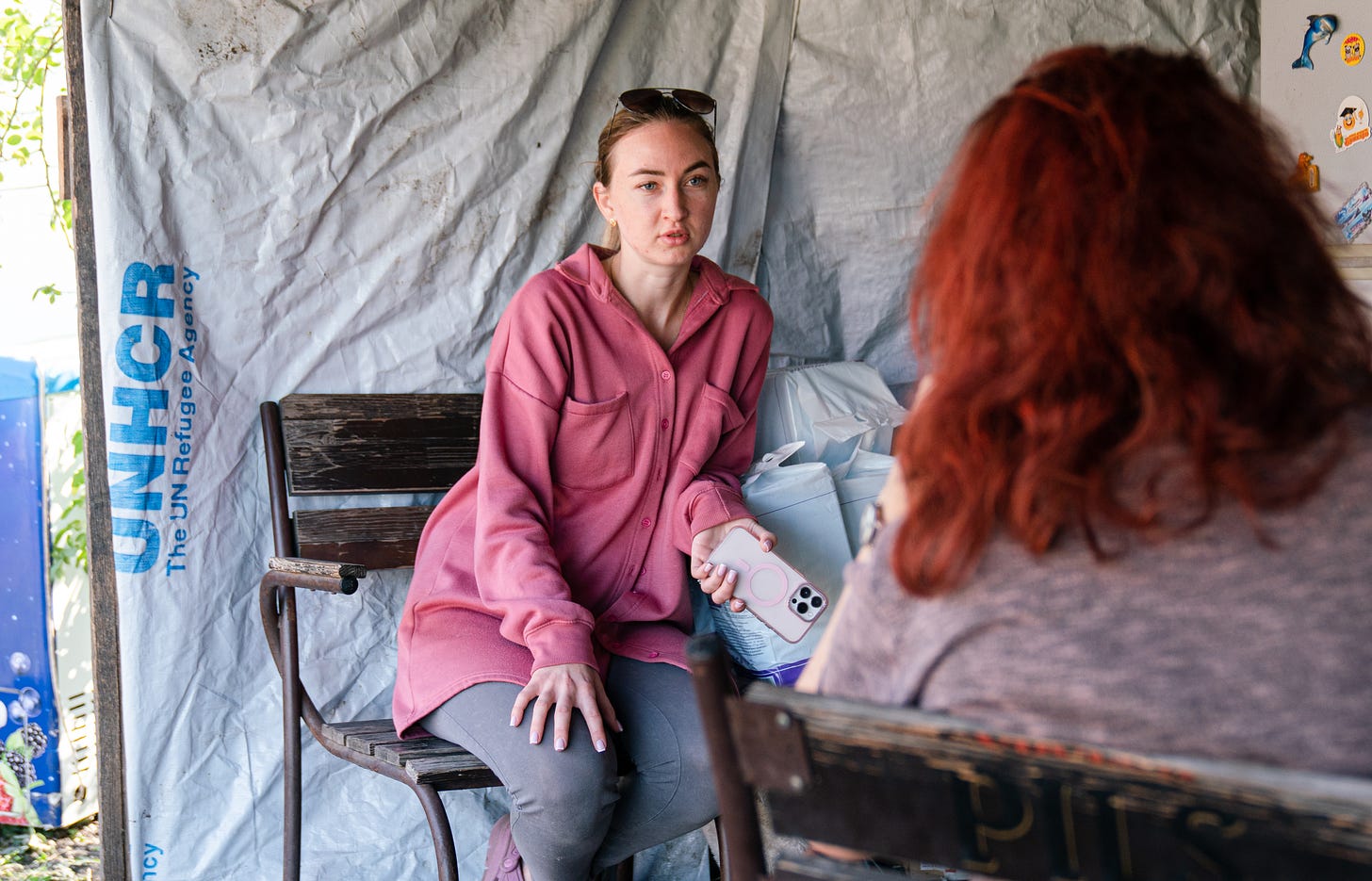
Back to Mospanove. How did your family manage while you were away?
Mum’s been here all along and doesn’t plan to leave. She wants to be here and help [elderly people who have stayed] because she understands there’s no one else to do it. As she says, who else but me will help?
Hrakove was occupied for five months. I remember Dad said that tanks came here from Hrakove and wanted the shop to open. And Dad realised that he was a man and if they spotted him… Well, something could happen. So he just hid in the bushes. They even drove into Grandma’s yard and knocked on her door, holding weapons, and asked her something. And obviously Dad was scared that, being a man, they might take him hostage or kill him.
But [the Russians] were quickly driven out. Our soldiers came from Blahodatne [a neighbouring village, not the Blahodatne in Mykolaiv region which Freefilmers have visited] and basically the Russians didn’t have time to shoot up the entire village, thank God. But people from the village still died, in the shelling. For example, my classmate’s father. He heard explosions, decided to go out and have a look, and that was it. He got a bullet in the neck, or maybe the head, and died right away.
The village looks a lot better than it did 18 months ago. Are people coming back?
I would say about sixty per cent of the people have returned. This is where I spent my childhood, my school, my friends, I grew up here. But I think the village is dying. Young people won't want to stay here because there is no school, no nothing.
My mother was born and grew up here, and she told me this was a very rich village. There was a lot of work, and people moved here. There was a brick factory, a bathhouse, a poultry farm. Four or five collective farms. Our grandmother came here to earn money. She’s from Rivne in western Ukraine and she came here to pick beets. And she met my grandfather here.
But I don't see any prospects here now. I don't see any prosperity here. Maybe if my mother stays, something will change, but I wouldn’t want to live here, because there’s no work.
Your mum is an important person in the village?
Yes, she’s very important. She was director of the House of Culture, the club opposite the school that has no roof now. Whenever there was a holiday, she wrote a play for it. As children, we always danced and sang there. Mum made us! We had a disco, a club – well, a rural one. Before the war, people came from many villages.
In fact, no matter how boring it is here, it's still fun when grandchildren come to visit their grandmas and grandpas. It’s safer than the city. There, you’re scared to send your child to the playground.
When we were here in spring, we attended the school prom. Where are those teenagers now?
I think they’re here, studying online. There’s no jobs here except farm work.
How do you feel about the contrast between the UK and Ukraine?
I remember, when we were in the house and a drone was flying around, it was so scary, the drone was so loud. And in England, I get scared every time I hear something flying. I think war is starting. I have a reaction, I immediately fall to the ground. That’s happened twice in England. We have a military base nearby [in Taunton], and sometimes military personnel, helicopters, drones fly there. I don’t like fireworks either. I immediately have some kind of panic attack and I can’t cope.
I read that PTSD can manifest in various different ways. After a bad experience, you might react to any sound. Every time, even if I'm in England, and I understand that I'm in a safe country, if I hear a helicopter, I immediately it’s probably war.
I still have that reaction. Maybe it’s because I haven’t been to a psychologist. Maybe I should!



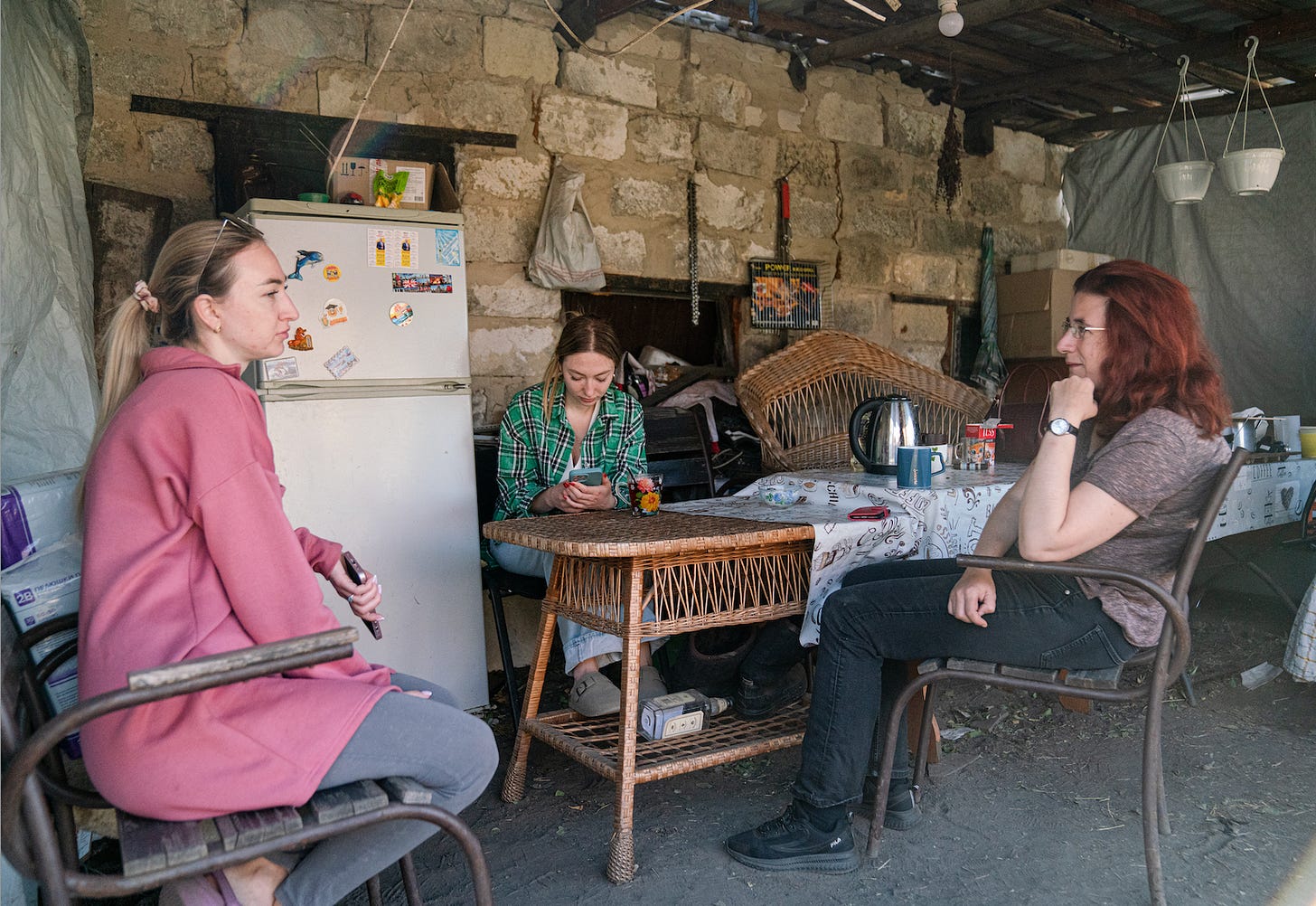
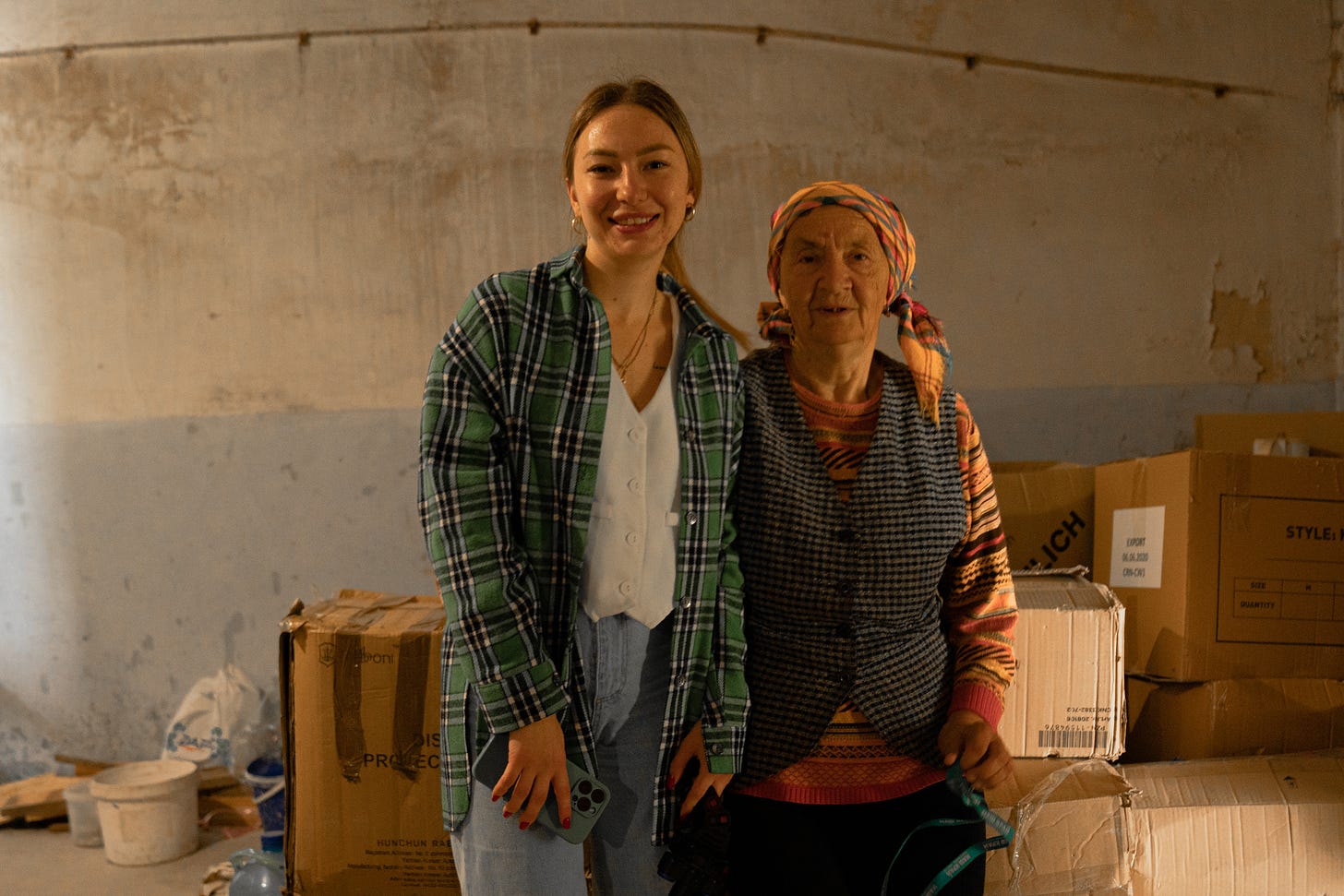

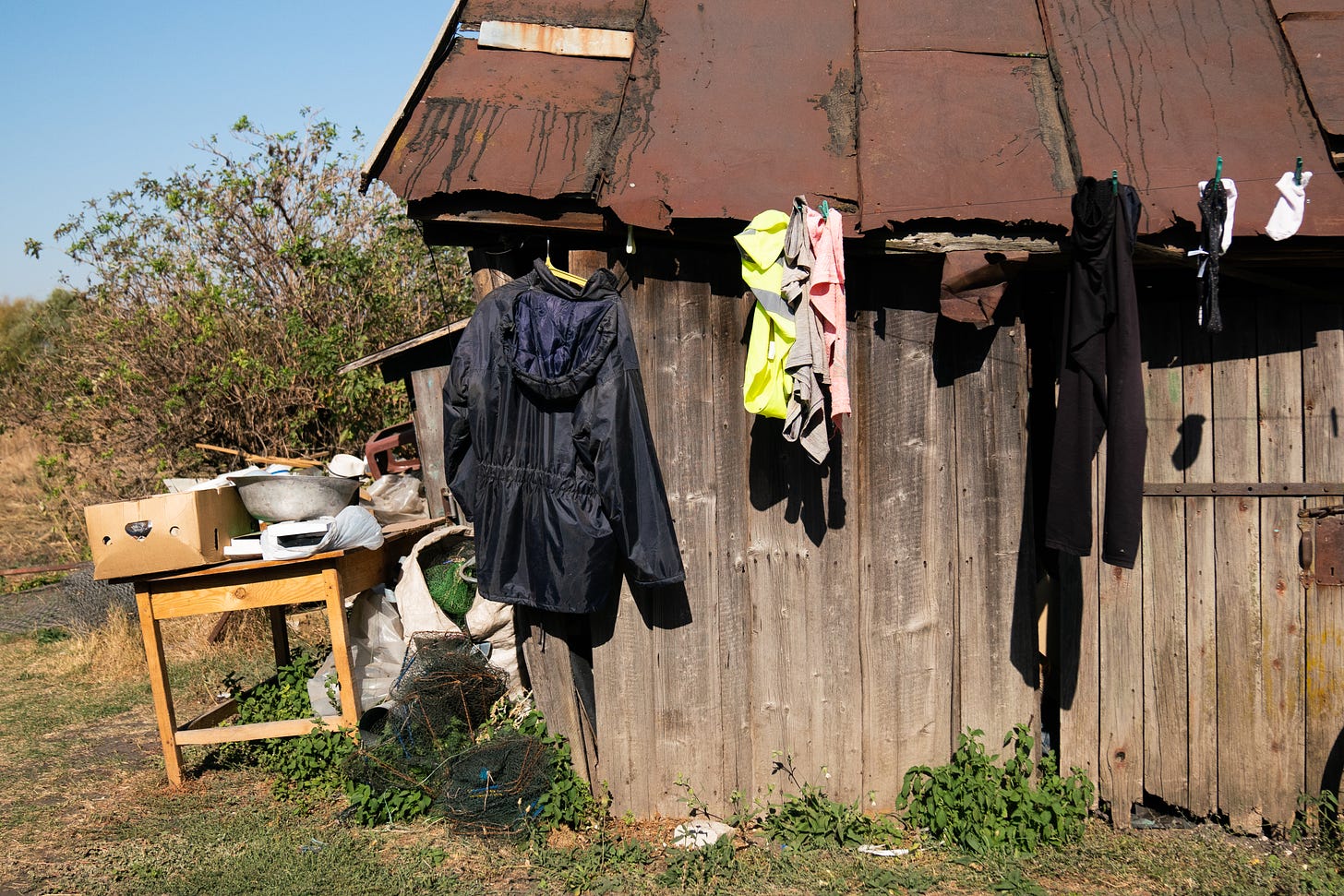
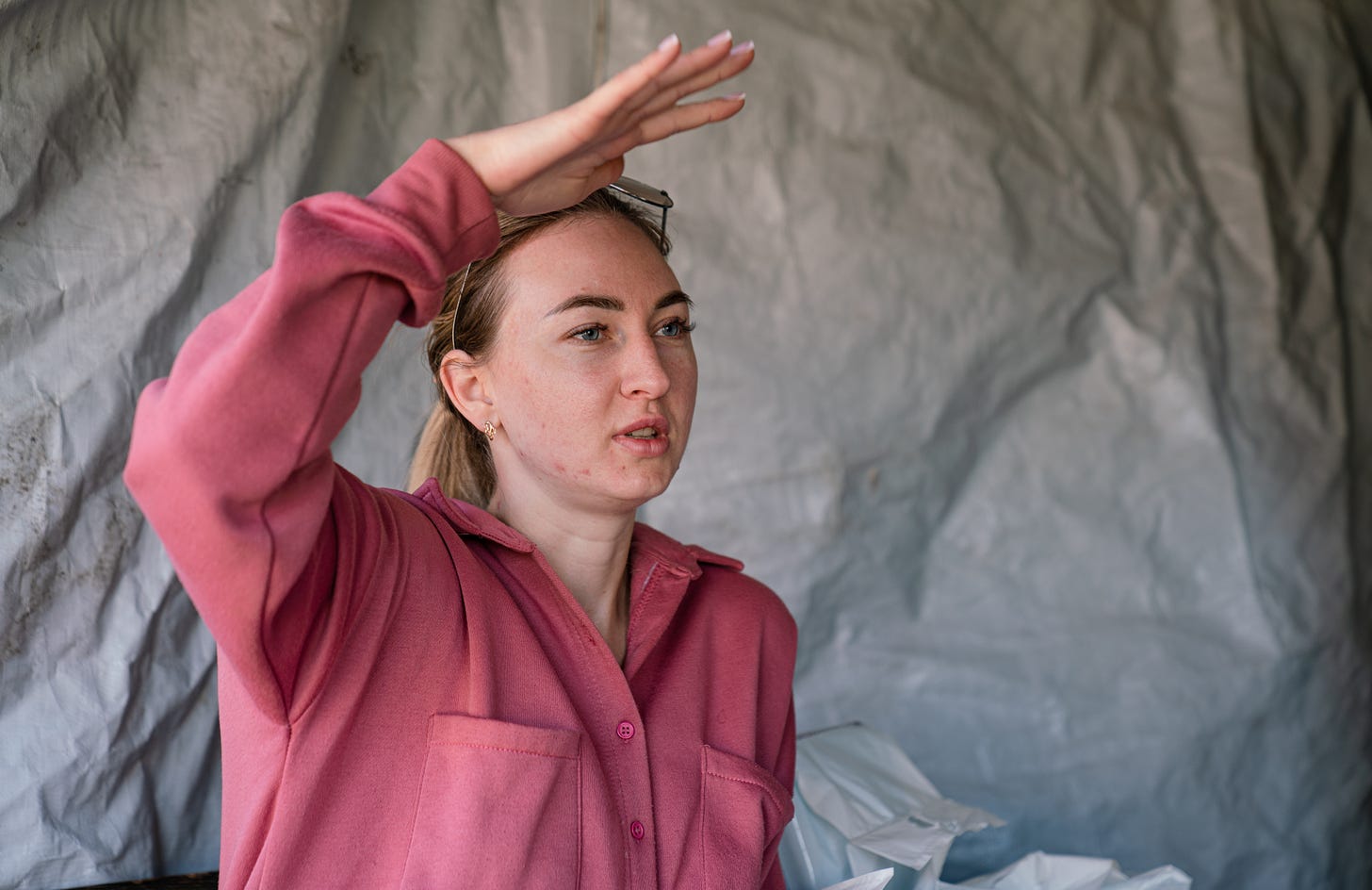
Thanks for the news, Anna. I look forward to reading your pieces.
Oksana's story reminded me my child 's experience of war. I am so old. I wrote a story, War by the eyes of child; I published it on Substack. Fortunately, she can go to England, I remember myself cold and hungry at my 3years old. War is a crime, and Putin must answer for his crimes.